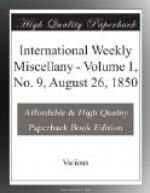A LETTER FROM WALTER SAVAGE LANDOR,
TO THE EDITOR OF THE ‘EXAMINER.’
Now the fever hath somewhat subsided which came over the people from the grave of Sir Robert Peel, there is room for a few observations on his decease and on its consequences. All public writers, I believe, have expatiated on his character, comparing him with others who, within our times, have occupied the same position. My own opinion has invariably been that he was the wisest of all our statesmen; and certainly, though he found reason to change his sentiments and his measures, he changed them honestly, well weighed, always from conviction, and always for the better. He has been compared, and seemingly in no spirit of hostility or derision, with a Castlereagh, a Perceval, an Addington. a Canning. Only one of these is worthy of notice, namely Canning, whose brilliancy made his shallowness less visible, and whose graces, of style and elocution threw a vail over his unsoundness and lubricity. Sir Robert Peel was no satirist or epigrammatist: he was only a statesman in public life: only a virtuous and friendly man in private. Par negotiis, nee supra. Walpole alone possessed his talents for business. But neither Peel nor his family was enriched from the spoils of his country; Walpole spent in building and pictures more than double the value of his hereditary estate, and left the quadruple to his descendants.
Dissimilar from Walpole, and from commoner and coarser men who occupied the same office, Peel forbade that a name which he had made illustrious should be degraded and stigmatized by any title of nobility. For he knew that all those titles had their origin and nomenclature from military services, and belong to military men, like their epaulets and spurs and chargers. They sound well enough against the sword and helmet, but strangely in law-courts and cathedrals: but, reformer as he was, he could not reform all this; he could only keep clear of it in his own person.
I now come to the main object of my letter.
Subscriptions are advertised for the purpose of raising monuments to Sir Robert Peel; and a motion has been made in Parliament for one in Westminster Abbey at the public expense, Whatever may be the precedents, surely the house of God should contain no object but such as may remind us of His presence and our duty to Him. Long ago I proposed that ranges of statues and busts should commemorate the great worthies of our country. All the lower part of our National Gallery might be laid open for this purpose. Even the best monuments in Westminster Abbey and St. Paul’s are deformities to the edifice. Let us not continue this disgrace. Deficient as we are in architects, we have many good statuaries, and we might well employ them on the statues of illustrious commanders, and the busts of illustrious statesmen and writers. Meanwhile our cities, and especially the commercial, would, I am convinced, act more wisely, and more satisfactorily to the relict of the deceased, if, instead of statues, they erected schools and almshouses, with an inscription to his memory.




